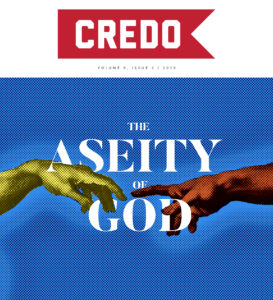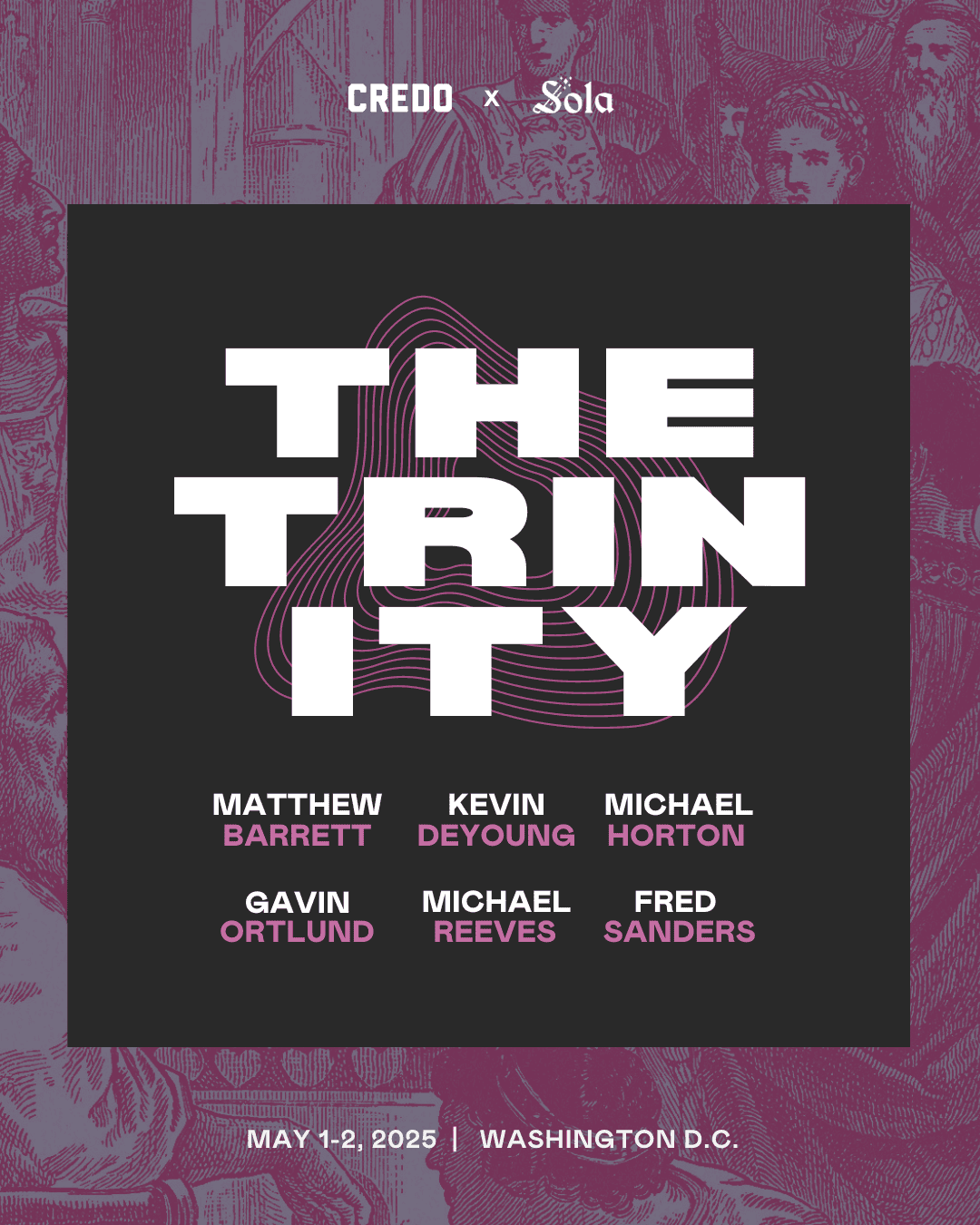In what ways have we domesticated the God of scripture? Why is it that we are so unfamiliar with attributes of God that protect God from being made in the image of the creature? In this interview, Matthew Barrett tells us about his new book, classical theism, and why an undomesticated God matters for evangelicals today.
Matthew Barrett is Associate Professor of Christian Theology at Midwestern Baptist Theological Seminary, as well as the founder and executive editor of Credo Magazine. He is the author of several books, including None Greater: The Undomesticated Attributes of God; 40 Questions About Salvation; God’s Word Alone: The Authority of Scripture; Reformation Theology: A Systematic Summary; Salvation by Grace, and Owen on the Christian Life. He is the host of the Credo podcast where he engages top theologians on the most important theological issues today.
In None Greater: The Undomesticated Attributes of God (Baker), you argue that Christians in the past century have absorbed a view of God that is far too small, and one that is not in sync with both scripture and the classical portrait of God. How did the doctrine of God fare in the 20th century?
When I reflect on my upbringing as a young Christian, I have found that it is not unique to the way other 20th century Christians grew up in the church. God had always been introduced into conversations in a very experiential way: love is a common human experience, so God must be a God of love; mercy is a commendable virtue, so God must be a God of mercy; and so on. Thinking about God was always from the bottom up—that is, from my experience to who God is.
This approach, however, is not new but can be seen in the 19th century as well. Rather than looking to the transcendent, supernatural God of the Bible, who defies the finite realm, Christians preferred what Brian Davies calls “theistic personalism,” or what David Bentley Hart labels “monopolytheism.” Monopolytheism sounds like an oxymoron, “monotheism” referring to the belief in one God and “polytheism” the belief in many gods. But that’s the point; it is oxymoronic. As Hart explains in his book The Experience of God, it is that popular, though contradictory, belief that God is not “conspicuously different from the polytheistic picture of the gods as merely very powerful discrete entities who possess a variety of distinct attributes that lesser entities also possess, if in smaller measure.” This view “differs from polytheism,” Hart believes, “solely in that it posits the existence of only one such being” (127).
The monopolytheistic approach to God may be common but it is dangerous, always flirting with the possibility of creating a God in our own image, always defining God’s attributes according to our own limitations. In this scheme, God is not fundamentally a different type of being, just a bigger and better version of ourselves. As a result, the Creator-creature distinction diminishes since God is only quantitatively superior, not qualitatively of a different class or species, to use the vocabulary of Aquinas.
By contrast, Augustine, Anselm, and Aquinas (let’s call them the A-team) first thought of God as one who is not like us. He is not a God, for example, who simply possesses our powers but in endless measure. No, an infinite God transcends our characteristics and limitations altogether. The creation may be great in size, but God is unlimited in his very being. His greatness is one of essence.
Consider, for example, the beginning of Augustine’s Confessions (1.4). Carefully differentiating between the Creator and the creature, Augustine is like an acrobat walking the tightrope. Yes, God is immanent (“intimately present”), but he remains transcendent and incomprehensible (“deeply hidden”). Yes, he effects change in the world (“changing all things”), but he never changes in himself (“immutable”). Yes, he creates and renews, but he himself is timelessly eternal (“never new, never old”). Yes, he brings the world into maturity, but he never matures, nor is he ever in need of reaching his potential or being activated; he is maximally alive, pure act (“always active”). Yes, he loves, but always impassibly (“you love without burning”). And yes, he redeems, paying our debt, but only because he owes debt to no one, being a God of absolute aseity.
All that to say, while the 19th and 20th centuries jettisoned the classical view—and in a hurry!—in order to make God relationally immanent, the A-team was suspicious of any attempt to domesticate the transcendent God Isaiah says is high and lifted up (Isa. 6:1).
None Greater does not approach the attributes of God like most books. What in particular have you tried to emphasize and why?
The answer is found in Anselm’s Monologion and Proslogion, two works ignored today. Anselm asks a probing question: Is God someone than whom none greater can be conceived? If he is, then he must be the most perfect being conceivable. And if he is the most perfect being conceivable, then certain perfect-making attributes—or perfections—must follow. Is God someone than whom none greater can be conceived? If he is, then he must be the most perfect being conceivable. Share on X
While I discuss many of these perfections in my book, it helps to begin with God’s infinitude. A finite being is, by definition, limited. An infinite being is, by definition, unlimited. To be infinite is to be unbounded, immeasurable, unfathomable, and inestimable in every way. Put positively, to be infinite means God is his attributes in an absolute sense, since he is the fullness of being. God is his perfections in infinite measure.
As the infinite deity, then, any limitation must be ruled out of the question. Should he be limited in some way—limited by time or space, limited in his power or knowledge, limited by change or emotional fluctuation, or limited by divisible parts—then no longer could he be infinite. Some type of limitation would be introduced into the very essence of God. No longer would he be the most perfect being. Someone or something greater could be conceived than a limited being.
However, if he truly is an infinite being, then certain perfect-making attributes fall in place, perfections like aseity, simplicity, immutability, impassibility, and timeless eternity, perfections that shield God from being crippled by limitations, perfections that ensure he remains the most perfect, supreme, and glorious being. As the Puritan Stephen Charnock once said, “No perfection is wanting to God.” A “limited one is an imperfection,” but an “unbounded essence is a perfection.”[1]
Another contribution your book makes to the doctrine of God is the way each chapter and attribute relates to every other chapter and attribute. Is there a tapestry to these attributes?
Not explicitly stated, but quietly interwoven throughout Augustine’s prayer mentioned earlier, is a foundational premise: the attributes sing in harmony. While simplicity—the belief that God is not made up of parts, but he is his attributes—is never mentioned in Augustine’s prayer, it is infused throughout. Augustine not only balances God in himself with how God relates to his creation, but he never partitions one attribute from another, believing each to illuminate the other.
In the book I provide many examples but consider just one: how God’s aseity and simplicity relate to one another. If God is life in and of himself, being self-existent and self-sufficient, then it follows that he is not a God made up of various parts, for if he were, then he would depend on those parts, which would violate his aseity. To make matters worse, not only would he depend on those parts, but those parts would even precede him. “Everything composite,” Aquinas remarks, “is subsequent to its components and dependent on them.” A God made up of parts cannot be “the first of all beings.”[2] So, in the end, if God is composite, made up of parts, then his aseity is compromised.
Point is, to modify or abandon any one attribute of God is to do untold harm to all that is in God because he is, after all, one, simple essence. To modify or abandon any one attribute of God is to do untold harm to all that is in God because he is, after all, one, simple essence. Share on X
In writing, what has most challenged or nourished you as a believer?
Often, I hear the objection that the classical—or what I am calling the “undomesticated”—attributes of God are abstract and removed from the storyline of scripture, something for theologians to speculate about but irrelevant to the Christian life. But I have found the opposite to be true: without these attributes the gospel and the Christian life cannot stand.
For example, consider God’s impassibility. If God undergoes emotional change and if his perfections, his essence, or his actions fluctuate in response to the creature, then it is reasonable to wonder whether God’s promises, Christ’s saving work to fulfill those promises, and the application of those promises both now and in the future are entirely certain. If God’s perfections change, if he fluctuates from one emotional state to the next, then his promises might change as well.
A passible God would leave us in a state of anxiety, unsure whether he will remain constant in who he is and what he says. His wrath would not be just, because his retribution is potentially uncontrollable. His love would not be steadfast, as the Psalms repeatedly say it is, for a passible love guarantees no certainty of devotion. Impassibility, it must be granted, is the basis on which God’s steadfast love and justice are built.
If God is passible, we might also conclude that God is pathetic. At first, it might feel comforting to hear someone say, “You are suffering? God suffers with you.” But any immediate comfort gained quickly dissipates when we realize that such a God needs just as much help as we do. A suffering God is a God we start to feel sorry for, not a God we seek help from or take refuge in. What we need is a God who does not suffer, a God who is our rock and fortress, as the psalmists confess. Only that kind of God is then able to help those who do suffer; only that kind of God is free to relieve the suffering of others. As Thomas Weinandy says, “The absence of suffering allows God’s love to be completely altruistic and beneficent.”[3] Not only God’s power to rescue but his ability to do so out of love significantly depends on his impassibility.
The cross is a case in point. It is precisely because God does not suffer that he is able to send his Son to suffer for us as a man. As I explain in my book, that does not mean that Christ’s divine nature suffers; we must be careful not to confuse the human nature with the divine nature, humanizing his divine attributes. But it does mean that the person of the Son suffers on the cross in the fullness of his humanity. Yet he is able to do so only because suffering does not victimize him in the first place. If God is just as much a victim of suffering as we are, then he is helpless, powerless, and hopeless to embark on a rescue mission. That is not the picture we see in the Gospels. The Gospels portray the Son of God fully in control of his mission. Again and again, as he sets his face toward Calvary, he announces, even predicts, his redemptive suffering, putting on full display his total sovereignty (Matt. 16:21–23).
Not only does impassibility guarantee that Christ can save sinners, but impassibility guarantees that God’s love and grace are free. If God is passible, then his love is contingent on the creature. According to a modern thinker like Jürgen Moltmann, God’s love depends on the creature for its fulfillment. A real give-and-take relationship requires passionate love, a love that is mutually dependent and changed by the one it loves. However, such passionate love is entirely conditioned on humans. Grace is no longer free, mercy no longer a gift, and love no longer gratuitous. God must look to those outside himself for love. But the Bible teaches throughout that God’s love is unconditional, free, and purely altruistic. Why? Because this love is impassible. It does not look to the creature for its effectiveness. It is rooted in God’s immutable nature.
In the end, only a God who does not suffer can accomplish redemption for a suffering humanity. Only one who is impassible can become incarnate as the suffering servant. And only one whose love depends on no one can offer grace that is free of charge.
Your book just released! But if you could recommend one other book for a pastor to read, what would it be?
Stephen Charnock’s The Existence and Attributes of God.
You haven’t really meditated on who God is until you’ve read Charnock. He captures both the deep orthodoxy of classical theism and its relevance for the Christian life. Spend a lifetime reading Charnock and you might just be ready to spend an eternity knowing God.
Endnotes
[1] Stephen Charnock, The Existence and Attributes of God, 1:383.
[2] Thomas Aquinas, Summa 1a.3.7.
[3] Thomas Weinandy, Does God Suffer? 206


